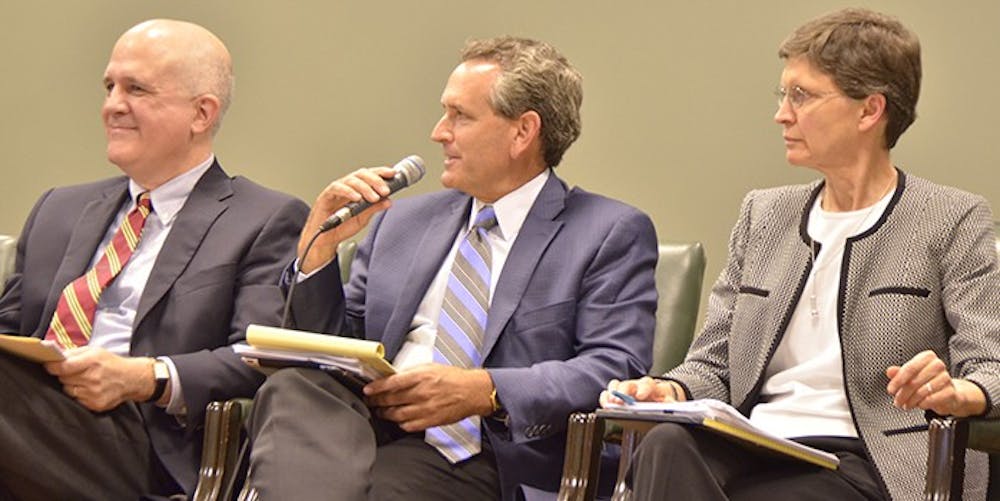One recommendation — that athletes who are “specially admitted” to the University should take a year off from playing — has been said by administrators and Rawlings to be the least feasible change to make at UNC without broader action.
The report states that taking a year off from varsity competition could allow at-risk athletes to focus on academics.
There are 160 specially admitted athletes each year, which Farmer defines as students who would not have been admitted if it were not for their athletic talents.
Of the 160, 14 students are predicted to have a GPA of below 2.3.
That number is predicted based on past performance of other student athletes.
Eight of the 14 students are from the revenue sports —football and basketball.
Chancellor Carol Folt said she was not sure if a one-size-fits-all policy was the best way to approach the issue and the proposal might need additional research.
“If you’re going to put in a blanket rule, the data shows that students excel when they’re in their sport rather when then they’re not,” she said.
Athletics Director Bubba Cunningham, a leader of the working group, said if UNC was the only school to implement the policy it would put the University at a competitive disadvantage against other schools.
But Wayne Lee, chairman of the Peace, War and Defense department, questioned why the reforms could not begin at UNC.
“The response has been, this needs to happen at the national level,” he said. “I’d like UNC to respond to this: Why can’t UNC do this?”
“In competitive disadvantage, I hear what you say, but this would only be for special admits. It’s really a revenue consideration and not a student success consideration.”
To get the day's news and headlines in your inbox each morning, sign up for our email newsletters.
Additional oversight
The committee also discussed whether athletes should have limits on the amount of hours they can dedicate to sports.
Members of the working group said though limiting practice hours could work for some students, it might not be the best idea for every athlete or sport.
Similarly to the year of readiness requirement, administrators brushed off the idea as a change to be made solely at UNC’s campus.
“Hours are really tough and something we need to look at on a national basis,” Cunningham said. “We’re in a very high profile arena and we need to be cautious. There are a lot of students benefitting from today’s model.”
Changing standards
Vincas Steponaitis, an anthropology professor, said the standards of admitting athletes overall could need re-evaluation.
“Theres a fundamental question that I think a lot of faculty are worried about,” he said. “The system we have is that we’re admitting students who can’t do the work. I believe admissions should be about bringing in diverse class but what would be the downside or consequences of lifting the threshold.”
But Farmer said raising the standards could exclude athletes who could excel at UNC.
“The truth is, to be fair to everyone you can’t weigh everyone on the scale,” Farmer said in an interview earlier this month. “The point is that we have to use different scales to be true to the experience of kids.”
Joy Renner, chairwoman of the faculty athletics committee, said Friday’s discussion about admissions was part of a larger conversation about college athletics.
“To tie in other things, when I started this job I didn’t know if we could be a Division I athletics school and a research university,” she said. “I still don’t know the answer. But we’re in a position to say this is who we are, this is who we admit, this is what we do and how we do it.”



